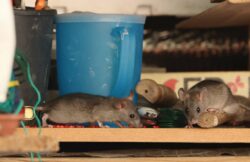As cooler weather creeps in, so do Florida rodents seeking shelter for the winter. Though small, Florida rodents can pose a serious hazard to your health and home. Protect your Florida home this winter by learning how to keep rodents out of your house with expert advice from McCall Service.
Types of Rodents in Florida
The rodent family of animals is made up of thousands of species, all characterized by continually-growing incisor teeth.
The most common Florida rodents are:
- Mice: small rodents, usually light brown or gray, that are drawn to dark, secluded areas.
- Squirrels: brown, gray, or black rodents known for their large, fluffy tail and commonly inhabit trees.
- Rats: larger rodents, either black or brown, that are excellent climbers. You’ll find several kinds of rat in Florida, including the Roof Rat and Norway Rat.
Other Florida rodents may include chipmunks, gophers, groundhogs, and various species of rats and mice.
Dangers of a Rodent Infestation
Rodent infestations can be extremely dangerous to your household’s health and well-being. Rodents can carry many diseases, and they may contaminate food supplies and surfaces with their droppings and urine.
Their teeth are also able to chew through many building materials, rendering damage to the integrity of a structure population or causing electrical shorts and fires through damaged wiring.
How to Keep Rodents Out of Your House
The best way to protect your home from a rodent infestation is with prevention. By taking the proper measures when rodent-proofing, you can greatly reduce the chance of ever having an issue, but knowing how to keep rodents out of your house is key.
First, eliminate the factors that entice Florida rodents to settle in an area: food sources and clutter. These provide rodents with essentials to start a full colony and create an infestation.
To get started, consider the following:
- Store food in secure, air-tight containers
- Dispose of food waste in secure trash receptacles
- Trim overgrown trees and bushes
- Tidy storage in basements, attics, and closets
- Move any wood piles away from the house
After removing these attractors, you’ll then want to assess possible rodent entry points into your home.
Depending on the species, rodents can travel both above and below. Assess the exterior of your home—the roof, foundation, doors, windows—for possible entry points. Some rodents can enter through holes the size of a quarter, so be sure to liberally seal any holes you find.
Signs of a Rodent Infestation
Sometimes, even despite your best rodent-proofing efforts, you can still have one sneak into your home. Rodents may find an entry point you didn’t see or even gnaw a new one themselves.
Before you see any rodents, you may hear them. Sounds of scratching, scampering, or chewing can indicate rodents are settling in your home. Rodents will also often cause stress to your pets, who might react by whining, scratching, or investigating part of your home.
The following are also indicators of an infestation:
- Gnaw marks
- Damaged goods
- Grease spots
- Chewed wires
- Small footprints
Don’t Wait—Give McCall a Call
A rodent infestation only takes a matter of time to turn from bad to worse. Don’t let Florida rodents take over your home this winter—call McCall for a free quote. With many years of combined experience in Florida rodent control, we guarantee your satisfaction. Plus, with McCall Services, you can save money on your Florida rodent control when you learn about our Value Bundles. Get started today!



